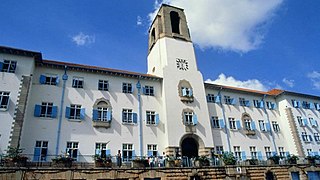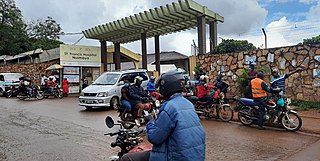
Makerere University is Uganda's largest and oldest institution of higher learning, first established as a technical school in 1922, and the oldest currently active university in East Africa. It became an independent national university in 1970. Today, Makerere University is composed of nine colleges and one school offering programmes for about 36,000 undergraduates and 4,000 postgraduates. The main administrative block was gutted by fire in September 2020 and the cause of the fire is yet to be established.

Uganda Martyrs University (UMU) is a private University affiliated with the Roman Catholic Church in Uganda. The University is owned by the Episcopal Conference of the Catholic Bishops of Uganda. It is licensed by the Uganda National Council for Higher Education. UMU consists of seven Faculties, two Institute, six Campuses, nine Departments, and three schools. As of March 2022, total student enrollment is 4,632. Of these, about 1,500 students were residential, while nearly 3,000 students were enrolled in UMU's distance learning programs. The number of staff members was over 400.
Namilyango College is a boys-only boarding secondary school located in Mukono District in the Central Region of Uganda, whose history and excellence in sports and academics have made it one of the most prestigious schools in Uganda. It is Uganda's oldest secondary school, founded in 1902 by the Catholic Mill Hill Fathers.

St. Francis Hospital Nsambya, commonly known as Nsambya Hospital, is a hospital in Kampala, the capital of Uganda and the largest city in that country.
The Kampala–Jinja Highway is a road in Uganda, connecting the cities of Kampala and Jinja. Sometimes referred to as Kampala–Jinja Road, it is a busy road, with several towns, trading centers and other points of interest along the way. As of October 2016, a new, wider, four-lane dual carriageway expressway, the Kampala–Jinja Expressway, is proposed to be constructed south of the present highway to relieve traffic and complement existing transport infrastructure between Kampala and Jinja.
Mt. St. Mary's College Namagunga is an all-girl boarding secondary school located in Mukono District in Uganda. The school is affiliated with the Roman Catholic Diocese of Lugazi.
The Makerere University School of Medicine (MUSM), also known as the Makerere University Medical School, is the school of medicine of Makerere University, Uganda's oldest and largest public university. The medical school has been part of Makerere University since 1924. The school provides medical education at diploma, undergraduate, and postgraduate levels.
Makerere University School of Public Health (MUSPH) is one of the schools that comprise the Makerere University College of Health Sciences, a constituent college of Makerere University, Uganda's oldest and largest public university.
George Barnabas Kirya, MBChB, MMed, MSc, Dip.Bact., LLD (Honorary), is a Ugandan physician, academic, microbiologist, politician, and diplomat. He served as the chairman of the Uganda Health Services Commission from 2007 to 2012. Previously, from 1997 until 2003, he served as Uganda's High Commissioner to the United Kingdom.
Nelson Kawulukusi Sewankambo, MBChB, MMed, MSc, FRCP, LLD (Hon), sometimes spelled as Nelson Ssewankambo, is a Ugandan physician, academician, medical researcher, and medical administrator. He is a professor of medicine and former principal of the Makerere University College of Health Sciences, a semi-autonomous constituent college of Makerere University.
David M. Serwadda is a Ugandan physician, medical researcher, academic, public health specialist and medical administrator. Currently he is a Professor of Public Health at Makerere University School of Public Health, one of the schools of Makerere University College of Health Sciences, a semi-autonomous constituent college of Makerere University, the oldest university in Uganda. Serwadda is also a founding member of Accordia Global Health Foundation's Academic Alliance.
As of 2021, 11 universities in Uganda offer medical schools. Admission to medical school requires the candidate to have attained a Uganda Advanced Certificate of Education (UACE) as well as proficiency in Biology or Zoology, Chemistry and Physics at A-level standards. Training leading to the degree of Bachelor of Medicine and Bachelor of Surgery (MBChB) lasts five years. Major examinations are conducted after the first, second and fifth year, with additional evaluations after each clinical rotation. After successful completion of the fifth year, candidates complete a year of internship under the supervision of specialists. Postgraduate training is available at Makerere University School of Medicine and other Public and Private Universities in a number of medical and surgical disciplines. The training takes three to four years and leads to the Master of Medicine (MMed) degree. The East, Central and Southern Africa College of Health Sciences is nowadays another alternative postgraduate training pathway in Uganda, such as Membership [MCS (ECSA)] and Fellowship [FCS (ECSA)] of the College of Surgeons of East, Central and Southern Africa (COSECSA); as well as in Internal Medicine through the East, Central and Southern Africa College of Physicians (ECSACOP) and the College of Obstetrics and Gynecology of East, Central and Southern Africa (ECSACOG) for Obstetricians and Gynecologists.

Christine Joyce Dradidi Ondoa is a physician and medical administrator who is regarded as one of Uganda's finest leaders especially in ensuring that the quality of health service delivery in Uganda is improved, and discipline and ethical code of conduct among health workers is observed. She is a Ugandan paediatrician and Christian Leader. She currently serves as the Director General of the Uganda AIDS Commission. She was appointed to that position by the President of Uganda in February 2014. Prior to that, she served as a Senior Presidential Advisor to President Yoweri Kaguta Museveni on Public Health. She was a member of the board of directors of the Global Alliance for Vaccines and Immunization (GAVI). She was Minister of Health in the Ugandan Cabinet from 2011 to 2013. She was appointed to that position on 27 May 2011, but was replaced by Ruhakana Rugunda on 23 May 2013. On account of being a cabinet minister she was a member of the Ugandan Parliament, in an ex officio capacity. Prior to that, she was the Executive Director of Mbarara Regional Referral Hospital, one of the fourteen regional referral hospitals in Uganda.
Professor Paul George D'Arbela MBChB, FRCP, is a Ugandan physician, cardiologist, academic, and medical researcher. According to a 2008 published report, he is a professor of medicine and the dean of postgraduate studies at the Mother Kevin Postgraduate Medical School, based at St. Francis Hospital Nsambya in Nsambya, a neighborhood in Kampala.
Professor Charles Mark Lwanga Olweny, MBChB, MMed, MD, FRACP, is a Ugandan physician, oncologist, academic and medical researcher. Currently he is a professor of medicine and Immediate past vice-chancellor at Uganda Martyrs University, based at Nkozi, Mpigi District, in Central Uganda.
Mary Jossy Nakhanda Okwakol is a Ugandan university professor, academic administrator, zoologist and community leader. She is the current chairperson of the Uganda National Examinations Board.
Hakim Sendagire is a Ugandan physician, biochemist, academic and medical administrator. Currently he is the Dean at Habib Medical School, College of Health Sciences of the Islamic University in Uganda, a private university, one of the 41 universities in the country, as at February 2015.
Sabrina Bakeera Kitaka, commonly known as Sabrina Kitaka, is a Ugandan physician, pediatrician, pediatric infectious diseases specialist and academic, who serves as a senior lecturer in the Department of Pediatrics at Makerere University School of Medicine.
Uganda National Academy of Sciences is a nonprofit, scientific organization in Uganda, that brings together scientists from the behavioral, biological, physical and social sciences. These scientists work together to promote excellence in sciences by "offering independent, evidence-based advice for the prosperity of Uganda", according to the academy's brochure.
Francis A. Miiro,, was a consultant obstetrician and gynecologist in Uganda, who served as Professor of Obstetrics and Gynecology at Makerere University School of Medicine and concurrently as senior consultant obstetrician and gynecologists at Mulago National Referral Hospital, the teaching hospital of the medical school.




